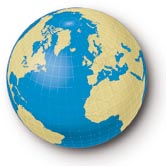Going
Global
Seven
University of Chicago faculty discuss how worldwide homogeny is
affecting their fields.
 The
signs are everywhere, and they're impossible to ignore: one language
disappears from the earth every ten days; space shuttle launches
are so commonplace that networks don't bother televising them
anymore; 2.3 percent of today's world population works outside
of their home country; the Internet has become so ubiquitous so
fast that children are teaching their parents how to install Web
site-blocking technology on the family computer. Call it what
you want-globalization, modernization, Disneyfication, the brave
new McWorld-there's no getting away from the technological dead
sprint which, over the past 100 years, has come closer every day
to making "cultures" obsolete in favor of a single world "Culture."
The
signs are everywhere, and they're impossible to ignore: one language
disappears from the earth every ten days; space shuttle launches
are so commonplace that networks don't bother televising them
anymore; 2.3 percent of today's world population works outside
of their home country; the Internet has become so ubiquitous so
fast that children are teaching their parents how to install Web
site-blocking technology on the family computer. Call it what
you want-globalization, modernization, Disneyfication, the brave
new McWorld-there's no getting away from the technological dead
sprint which, over the past 100 years, has come closer every day
to making "cultures" obsolete in favor of a single world "Culture."
Since
Claude Levi-Strauss pointed out in his 1955 Tristes Tropiques
the impossibility of studying the culture of another people without
also infecting them with your own (not a radically new idea, but
a benchmark confession in the social sciences), the notion of
"the other" has taken on a gradually diminishing role in the relationship
between encounterer and encountered, while its actual presence
has become an everyday event, leading to an international homogenization
unparalleled in world history.
Globalization
is the favored term today-a thick, juicy word that begs for quotation
marks and qualifiers, a perfect fit in postmodern academia for
its intentional vagueness, its all-encompassing bear hug, the
way it weighs on the tongue like heavy cream. But no matter the
unwieldy nature of the term, the phenomenon it describes is very
real, and its massive scope and cross-disciplinary appeal has
attracted academics around the world-to celebrate it, to decry
it, and to study it.
We
asked some Chicago scholars to examine their particular fields
through globalization-colored glasses, to examine the interconnectedness
of cultures, to tell us how their fields effect, and are affected
by, globalization. This is what they told us. -C.S.
Anthropologist
and cultural psychologist Richard A. Shweder:
From
"Free Trade" to "West is Best"
Linguist
Salikoko Mufwene:
Languages
don't kill languages; speakers do
Sociologist
of religion Martin Riesebrodt:
The
revival of religion in times of change
Sociologist
Saskia Sassen:
Detecting
the global inside the national
Human-rights
advocate Jacqueline Bhabha:
Weak
players in a strong market
Film
historian Tom Gunning:
The
world goes to the movies
Anthropologist
Arjun Appadurai:
New
questions for a new world

![]()
 The
signs are everywhere, and they're impossible to ignore: one language
disappears from the earth every ten days; space shuttle launches
are so commonplace that networks don't bother televising them
anymore; 2.3 percent of today's world population works outside
of their home country; the Internet has become so ubiquitous so
fast that children are teaching their parents how to install Web
site-blocking technology on the family computer. Call it what
you want-globalization, modernization, Disneyfication, the brave
new McWorld-there's no getting away from the technological dead
sprint which, over the past 100 years, has come closer every day
to making "cultures" obsolete in favor of a single world "Culture."
The
signs are everywhere, and they're impossible to ignore: one language
disappears from the earth every ten days; space shuttle launches
are so commonplace that networks don't bother televising them
anymore; 2.3 percent of today's world population works outside
of their home country; the Internet has become so ubiquitous so
fast that children are teaching their parents how to install Web
site-blocking technology on the family computer. Call it what
you want-globalization, modernization, Disneyfication, the brave
new McWorld-there's no getting away from the technological dead
sprint which, over the past 100 years, has come closer every day
to making "cultures" obsolete in favor of a single world "Culture."